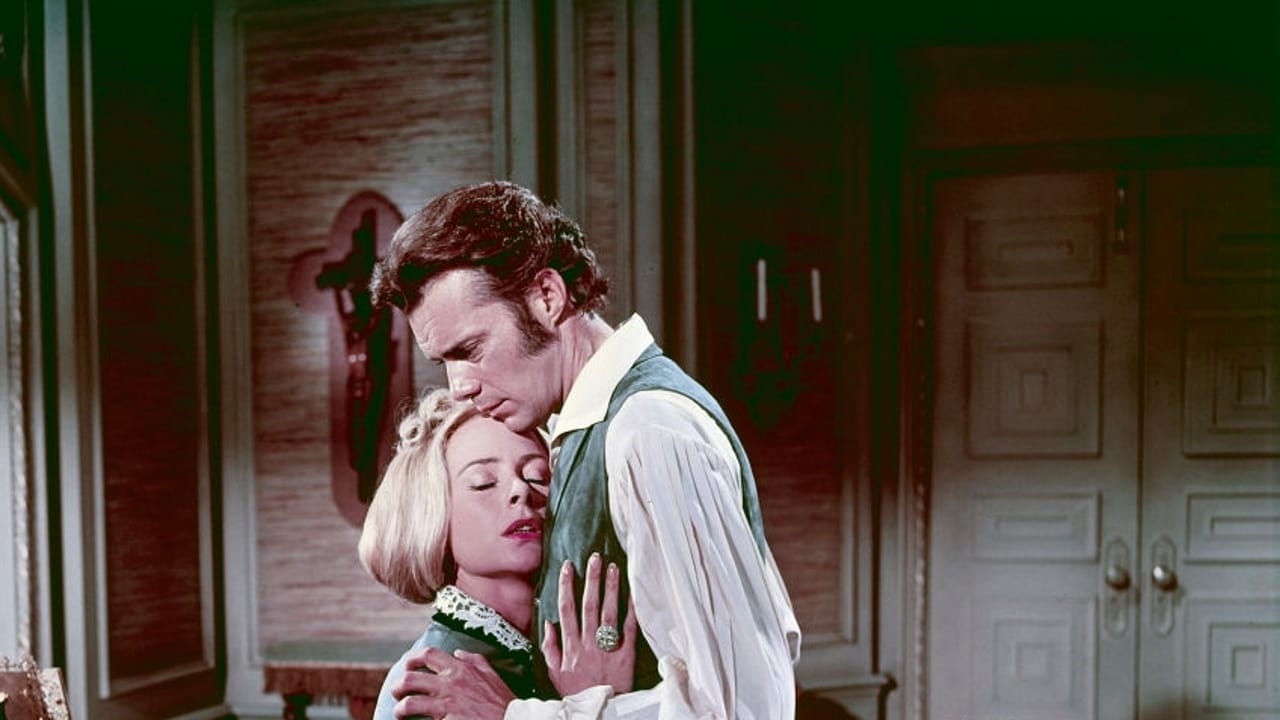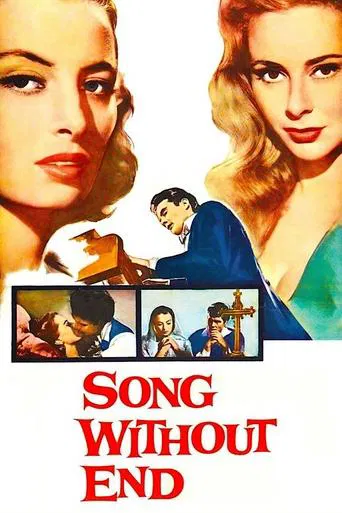

Really Surprised!
... View MoreFanciful, disturbing, and wildly original, it announces the arrival of a fresh, bold voice in American cinema.
... View MoreThe storyline feels a little thin and moth-eaten in parts but this sequel is plenty of fun.
... View MoreActress is magnificent and exudes a hypnotic screen presence in this affecting drama.
... View MoreWhile it may take time to warm to Liszt, if at all (personally this reviewer loves his music, if more when at an older age than younger), one cannot deny how influential he was as a composer and especially as a performer (he was incredibly important in his lifetime).'Song Without End' is certainly much better than Ken Russell's 'Lisztomania', a very hard to rate film that was visually striking but ruined by gratuitous excess and lack of taste, and does have many pleasures but biographically it disappoints. It is a visually sumptuous film for starters, it's very beautifully photographed, the costumes are lavish, richly colourful and true to period and the settings, interiors and scenery are gorgeous to watch. The music is definitely the highlight of 'Song Without End', whether it is bombastic and energetic like the second 'Hungarian Rhapsody' or intimate and poignant like the third 'Liebestraume', and it's all cleverly arranged. Contrary to one reviewer the inclusion of music of other composers was quite nice though there could have been a little more of Liszt's, 'Totentanz' would have been absolutely thrilling to listen to. One mustn't forget the magnificent playing of Jorge Bolet, absolutely agree that it is some of the best-performed classical music in film. Liszt's music is fiendishly and notoriously difficult for a pianist ('Totentanz' for example is hard enough with piano and orchestra, in solo piano version it's a killer), but Bolet , with such energetic, hugely musical and poetic playing, makes it sound effortless. 'Song Without End' is nicely directed, and never resorts to vulgarity or excess. While its representation of Liszt is not exactly a faithful one (one doesn't find it easy to believe him as that much of a womaniser, almost too much on the slightly sleazy side, and especially as a prima donna), it is not the literal character assassination of 'Lisztomania', because it also gets some things right like he was a man of great charity, was highly noble and women were attracted to him). 'Song Without End' is also not without its powerful and affecting moments, and the music plays an enormous part in why that is, the fact that Liszt played the music of other composers as well and that he was a fan of Chopin is incorporated remarkably intelligently.The cast are very good. Whether one takes issue with how Liszt is portrayed, it cannot be blamed at Dirk Bogarde's door but how he's written. Bogarde does an excellent job, and is very believable and charismatic whether amorous or more intense in the context of how Liszt is written and as a performance in general. Genevieve Page and especially Capucine are breathtakingly beautiful, and Page also plays the film's most sympathetic character very poignantly. Martita Hunt is also memorable, Hunt as is evidenced by her definitive Miss Havisham in David Lean's classic 'Great Expectations' had a knack for stealing scenes regardless of the size of the role. Bogarde and Capucine and particularly Bogarde and Page also convince together, quite touching in fact at times.For all its many good things, 'Song Without End' is not without its flaws. There is an exception to the high standard set by the cast, and that is agreed the miscast and out of place Lou Jacobi, whose appearance and the way he spoke being somewhat anachronistic and jarring. The film does drag in places, getting bogged down by a few strands like the greatly and too obviously romanticized romances (that are also factually distorted, the film fails to mention the Countess' emotional problems before meeting Liszt and how big a part it played in their break up). The story here is compelling but some things that were included could have been elaborated on in more detail. While there are some things that are faithful- like his devotion for art- it is every bit as easy to spot the inaccuracies and anachronisms, like the notion of Liszt feeling inferior to Chopin with the existence of his 'Transcendental Etudes' being long before he even met Chopin . It does focus too much on the romantic side of his character and not enough on his magnetic way of performing he held that earned him the admiration of several other fellow performers (it does focus on a small portion of his life and unfortunately it is not the most compelling or the most telling of Liszt's character). Lastly, some of the script is flimsy with some soap-opera-like dialogue and areas that were potentially interesting but lack depth.All in all, disappointing in some areas but also a film of many pleasures. 6/10 Bethany Cox
... View MoreThis is a very beautiful film made with great meticulousness and with a serious intention to for once stick to the truth in a biopic, and the actors are all superb, especially Martita Hunt as the Grand Duchess, the most convincing one. Dirk Bogarde is excellent as Liszt but not at all as he was, more like an English gentleman than the emotionally wayward and unstable victim of his own vanity with much confusion that he was. Capucine is spellbindingly beautiful as Carolyne carrying herself with great style, and Geneviève Page makes a very convincing Marie d'Agoult. But what about the others? George Sand makes a very brief appearance, Lola Montez is not allowed at all, and there were others. Instead of telling the truth the film devotes itself to the Liszt myths and embellishes them thoroughly, so that Franz Liszt would have liked it. Of course, this at least is preferred to the terrible character assassination "Lisztomania" by Ken Russell 1975 dragging it all down to vulgarity. At least, Liszt was never vulgar. On the contrary, he was very careful about excluding himself only to the highest circles of nobility, which the film conveys adequately. Still, it's not a great film, seconded by both the great Chopin films, like Liszt never came close to the genius of Chopin. The relationship with the Princess Carolyne is greatly romanticized, and Franz Liszt confessed himself that Marie d'Agoult was his only true love. Like Liszt himself, the film is gradually bogged down into his sanctimonious catholic penchant for superstition, he neglects his own life, music and love to follow the church and thus made a fool of himself instead of fulfilling his glorious career. Well, well. The film remains a most beautiful musical illustration to his life and enjoyable as such, while it leaves you deploring his bathos. The last third of his life (he became 75) was wasted getting mummified in the church with very few more compositions.
... View MoreI saw this movie for one reason--it starred Dirk Bogarde. He was a wonderful actor and I'd watch him in anything--even a bio-pic! My dislike of most bio-pics is important to note, as unlike the other reviewers, I really didn't adore Franz Liszt and the idea of a film about him. That's because in my opinion (and I am sure many will disagree), most biographical movies are either short on entertainment value (they can be sluggish) or they avoid this by playing fast and loose with the facts. Frankly, I don't like either extreme. But when it comes to Liszt, I have no idea if this film is accurate--he is someone about whom I know very little (other than the fact that Bogarde looked nothing like him and the film makers did little to correct this). But I do know that the film is lethargic...very, very lethargic. So, despite his affairs and illegitimate children, the film managed to make all this very, very dull--and that is a crime. How can a film that often focuses on the composer's scandalous relationships be so turgid?! Perhaps because all too often nothing happens in the film--just lots and lots and lots of scenes with Bogarde playing either the piano or the organ. And, as many of the songs were not Liszt's compositions, I just felt a bit bored. So, aside from nice music (though a bit too much of it) and nice costumes, I found the whole thing pretty stale. If you are a musician and/or adore Liszt, perhaps you'll have a very different opinion--I just know that Dirk Bogarde made other films with a lot more energy and entertainment value.
... View MoreOpulent film is terrific with Dirk Bogarde playing Franz Liszt in a totally memorable performance. Capucine, as the Princess Carolyne, and Genevieve Page, as the abandoned mistress, were truly terrific here as well as a fine supporting performance by Martita Hunt, as the Czar's sympathetic sister. Hunt literally made a career of playing strong, erudite women.The set decorations here are phenomenal, they're on par with the great 1944 film "Wilson."The music is magnificent although we could have done without knowing about the friendship between Liszt and the anti-Semite Richard Wagner. Another flaw is the miscasting of Lou Jacobi as Bogarde's manager. Jacobi sounded like he came out of the Catskills. This film for Jacobi came after his super performance, the year before, in the beloved "The Diary of Anne Frank." (Happy Birthday Lou as you turn 95 on Dec. 28th.)The first part of the film deals with Liszt's career. His playing in concerts in various European countries was remarkable. The second part deals with his ill-fated love with the Countess Cathryne of Lichtenstein.While we see that Liszt entered the priesthood when his proposed marriage to Cathryne was rejected, we really can't tell if Cathryne became a nun. I imagine no since she was still technically married in the eyes of the church. Nonetheless, we have a powerful, beautifully acted film. Too bad that Totentanz, a Liszt masterpiece, was not played here. I had to know that piece of grand music in a required music course at college. Like the movie, Totentanz was a masterful piece.
... View More